初中英语人教版八年级下册unit 2 section a
- 格式:doc
- 大小:1.43 MB
- 文档页数:13
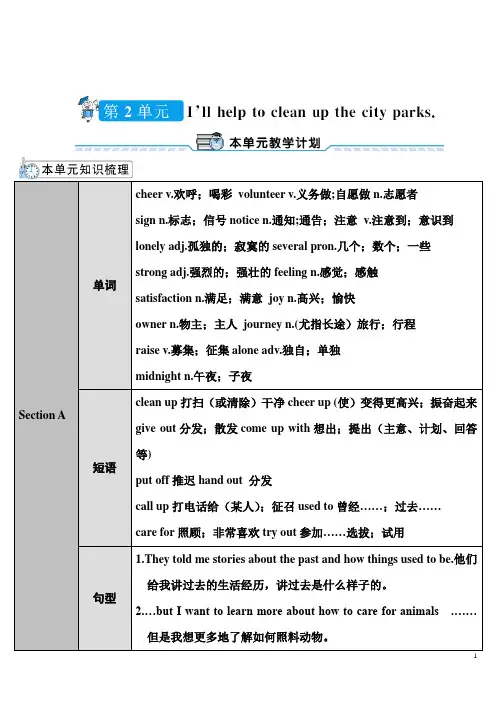
Section A 单词cheer v.欢呼;喝彩volunteer v.义务做;自愿做n.志愿者sign n.标志;信号notice n.通知;通告;注意v.注意到;意识到lonely adj.孤独的;寂寞的several pron.几个;数个;一些strong adj.强烈的;强壮的feeling n.感觉;感触satisfaction n.满足;满意joy n.髙兴;愉快owner n.物主;主人journey n.(尤指长途)旅行;行程raise v.募集;征集alone adv.独自;单独midnight n.午夜;子夜短语clean up打扫(或清除)干净cheer up (使)变得更高兴;振奋起来give out分发;散发come up with想出;提出(主意、计划、回答等)put off推迟hand out 分发call up打电话给(某人);征召used to曾经……;过去……care for照顾;非常喜欢try out参加……选拔;试用句型1.They told me stories about the past and how things used to be.他们给我讲过去的生活经历,讲过去是什么样子的。
2.…but I want to learn more about how to care for animals.……但是我想更多地了解如何照料动物。
句型1.I’m sure you know that this group was set up to help disabled people like me.我确定你知道这个团体是为了帮助像我这样的残疾人而建立的。
2.You helped to make it possible for me to have Lucky.有了你的帮助,我才有可能拥有“幸运儿”。
3.I’ll send you a photo of him if you like,and I could show you how he helps me.如果你喜欢,我会把它的一张照片寄给你,并可以让你看看它是怎样帮助我的。
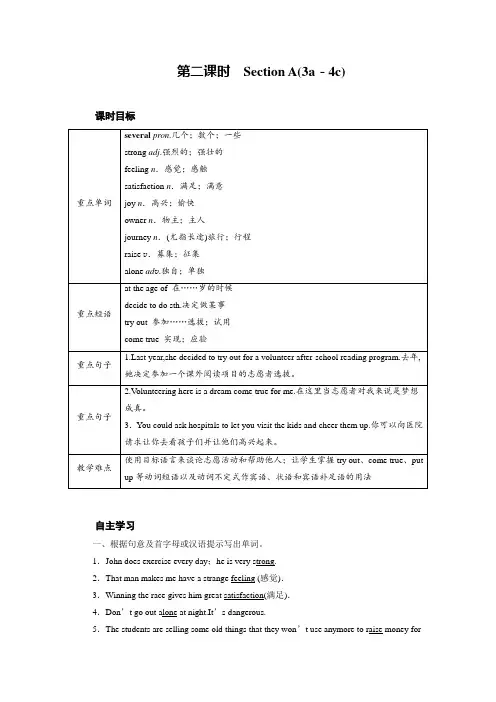
第二课时Section A(3a-4c)课时目标自主学习一、根据句意及首字母或汉语提示写出单词。
1.John does exercise every day;he is very strong.2.That man makes me have a strange feeling (感觉).3.Winning the race gives him great satisfaction(满足).4.Don’t go out alone at night.It’s dangerous.5.The students are selling some old things that they won’t use anymore to raise money forpoor children.二、写出下列画线短语的汉语意思。
1.She could read by herself at the age of four.在……岁的时候2.Mario loves animals and wants to be an animal doctor.兽医3.She decided to try out for a volunteer after-school reading program.参加……选拔;试用4.Volunteering here is a dream come true for me.实现5.I can do what I love to do and help others at the same time.同时教学过程环节1新课导入让学生听写以下短语,然后教师订正答案。
(教师可邀请两名学生到黑板前听写)打扫(或清除)干净________(使)变得高兴;振奋起来________分发;散发________想出;提出(注意、计划、回答等)________推迟________分发________打电话给(某人);征召________曾经……;过去……________照顾;非常喜欢________设计意图:温故知新,通过听写任务帮助学生记忆上堂课所学的短语,有利于知识间的衔接,便于老师循序渐进地开展教学。
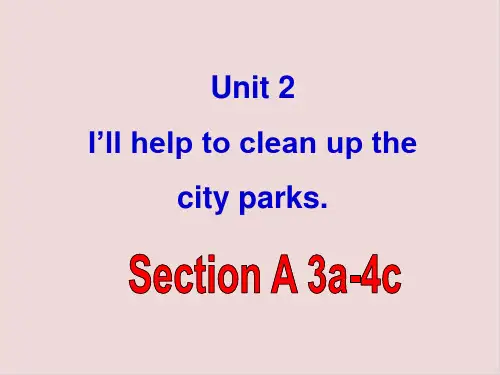
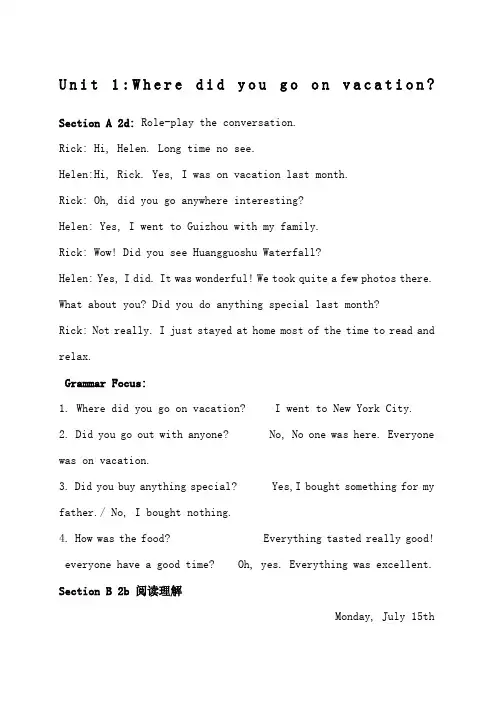
U n i t1:W h e r e d i d y o u g o o n v a c a t i o n? Section A 2d: Role-play the conversation.Rick: Hi, Helen. Long time no see.Helen:Hi, Rick. Yes, I was on vacation last month.Rick: Oh, did you go anywhere interesting?Helen: Yes, I went to Guizhou with my family.Rick: Wow! Did you see Huangguoshu Waterfall?Helen: Yes, I did. It was wonderful! We took quite a few photos there. What about you? Did you do anything special last month?Rick: Not really. I just stayed at home most of the time to read and relax.Grammar Focus:1. Where did you go on vacation? I went to New York City.2. Did you go out with anyone? No, No one was here. Everyone was on vacation.3. Did you buy anything special? Yes,I bought something for my father./ No, I bought nothing.4. How was the food? Everything tasted really good! everyone have a good time? Oh, yes. Everything was excellent. Section B 2b 阅读理解Monday, July 15thI arrived in Penang in Malaysia this morning with my family. It was sunny and hot, so we decided to go to the beach near our hotel. My sister and I tried paragliding. I felt like I was a bird. It was so exciting! For lunch, we had something very special –Malaysian yellow noodles. They were delicous! In the afternoon, we rode bicycles to are a lot of new buildings now, but many of the old buildings are still there. In Weld Quay, a really old place in Georgetown, we saw the houses of the Chinese traders from 100 years ago. I wonder what life was like here in the past. I really enjoyed walking around the town.Tuesday , July 16th What a difference a day makes! My father and I decided to go to penang Hill today. We wanted to walk up to the top, but then it started raining a little so we decided to take the train. We waited over an hour for the train because there were too many people. When we got to the top, it was raining really hard. We didn’t have an umbrella so we were wet and cold. It was terrible! And because of the bad weather, we couldn’t see anything below. My father didn’t bring enough money, so we only had one bowl of rice and some fish. The food tasted great because I was so hungry!Unit 2:How often do you exercise?Section A 2d:Jack:Hi, Claire, are you free next week?Claire: Hmm...next week is quite full for me, Jack.Jack: Really? How come?Claire: I have dance and piano lessons.Jack: What kind of dance are you learning?Claire: Oh, swing dance. It’s fun! I have class once a week, every Monday.Jack: How often do you have piano lessons?Claire: Twice a week, on Wednesday and Friday.Jack: Well, how about Tuesday?Claire:Oh, I have to play tennis with my friends. But do you want to come?Jack: Sure!Grammar Focus:do you usually do on weekends? I always exercise.do they do on weekends? They often help with housework.does she do on weekends? She sometimes goes shopping.often do you go to the movies?I go to the movies maybe once a month.often does he watch TV? He hardly ever watches TV.you go shopping? No, I never go shopping.Section B 2b 阅读理解:What Do High School Students Do In Their Free Time?Last month we asked our students about their free time activities. Our questions were about exercise, use of the Internet and watching TV. Here are the results.We found that only fifteen percent of our students exercise every day. Forty-five percent exercise four to six times a week. Twenty percent exercise only one to three times a week. And twenty percent do not exercise at all!We all know that many students often go online, but we were surprised that ninety percent of them use the Internet every day. The other ten percent use it at least three or four times a week. Most students use it for fun and not for homework.The answers to our questions about watching television were also interesting. Only two percent of the students watch TV one to three times a week. Thirteen percent watch TV four to six times a week. And eighty-five percent watch TV every day! Although many students like to watch sports,game shows are the most popular.It is good to relax by using the Internet or watching game shows, but we think the best way to relax is through exercise. It is healthy for the mind and the body. Exercise such as playing sports is fun, and you can spend time with your friends and family as you play together. And remember, “old habits die hard”.So start exercisingbefore it’s too late!Unit 3: I’m more outgoing than my sister.Section A 2d:Julie: Did you like the singing competition yesterday, Anna? Anna: Oh, it was fantastic! Nelly sang so well!Julie: Well, I think Lisa sang better than Nelly.Anna: Oh, which one was Lisa?Julie: The one with shorter hair I think she sang more clearly than Nelly.Anna: Yes, but Nelly danced better than Lisa.Julie: You can tell that Lisa really wanted to win, though. Anna: Well, everyone wants to win. But the most important thing is to learn something new and have fun.Grammar Focus:Tom smarter than Sam?No, he isn’t. Sam is smarter than Tom.2. Is Tara more outgoing than Tina?No, she isn’t. Tina is more outgoing than Tara.3. Are you as friendly as your sister?No, I’m not. I’m friendlier.4. Does Tara work as hard as Tina?Yes, she does.5. Who’s more hard-working at school?Tina thinks she works harder than me.Section B 2b阅读理解:Jeff Green:My mother told me a good friend is like a mirror. I’m quieter and more serious than most kids. That’s why I like reading books and I study harder in class. My best friend Yuan Li is quiet too, so we enjoy studying together. I’m shy so it’s not easy for me to make friends. But I think friends are like books – you don’t need a lot of them as long as they’re good.Huang Lei:It’s not necessary to be the same. My best friend Larry is quite different from me. He is taller and more outgoing than me. We both like sports, but he plays tennis better, so he always wins. However, Larry often helps to bring out the best in me. So I’m getting better at tennis. Larry is much less hard-working, though. I always get better grades than he does, so maybe I should help him more. Mary Smith:I don’t really care if my friends are the same as me or different. My favorite saying is, “ A true friend reaches for your hand and touches your heart.” My best friend Carol is really kind and very funny. In fact, she’s funnier than anyone I know. I broke my armlast year but she make me laugh and feel better. We can talk about and share everything. I know she cares about me because she’s always there to listen.。
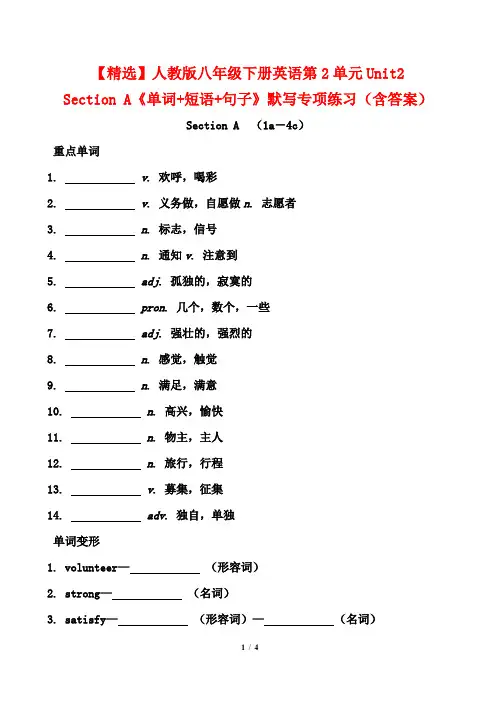
【精选】人教版八年级下册英语第2单元Unit2 Section A《单词+短语+句子》默写专项练习(含答案)Section A (1a-4c)重点单词1. v. 欢呼,喝彩2. v. 义务做,自愿做n. 志愿者3. n. 标志,信号4. n. 通知v. 注意到5. adj. 孤独的,寂寞的6. pron. 几个,数个,一些7. adj. 强壮的,强烈的8. n. 感觉,触觉9. n. 满足,满意10. n. 高兴,愉快11. n. 物主,主人12. n. 旅行,行程13. v. 募集,征集14. adv. 独自,单独单词变形1. volunteer—(形容词)2. strong—(名词)3. satisfy—(形容词)—(名词)4. joy—(形容词)5. own—(名词)6. raise—(过去式)—(现在分词)重点短语1. 清理2. 振奋起来,(使)变得高兴3. 分发;散发4. 提出;想出5. 推迟6. 召集;打电话给7. 过去……8. 喜欢;照顾9. 在……岁10. 参加……选拔,试用11. 同时12. 自愿做某事13. 愿意,想要做重点句型1. They told me stories about the past and how things .他们给我讲过去的故事,讲事物过去是什么样子的。
2. I such a strong feeling of satisfaction when I see the animals get better…。
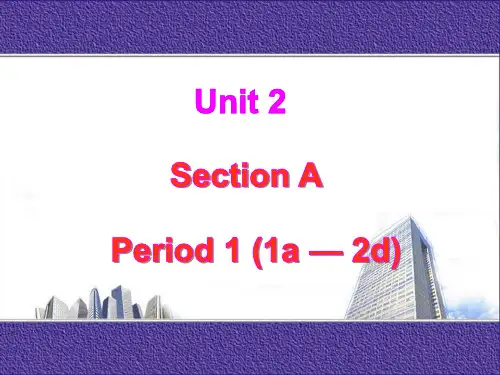
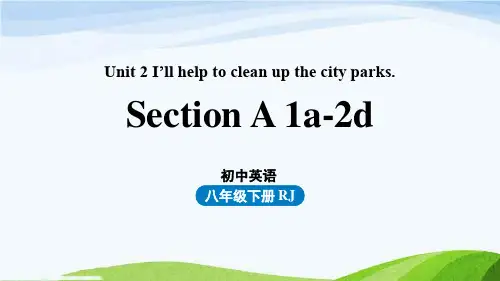
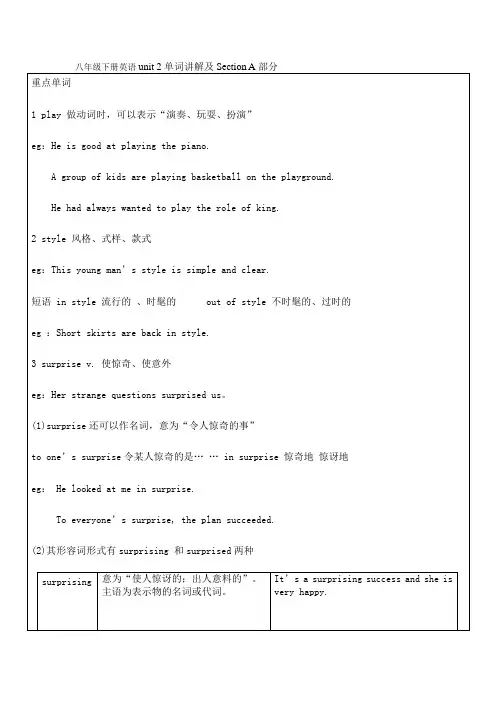
八年级下册英语unit 2单词讲解及Section A部分重点单词1 play 做动词时,可以表示“演奏、玩耍、扮演”eg:He is good at playing the piano.A group of kids are playing basketball on the playground.He had always wanted to play the role of king.2 style 风格、式样、款式eg:This young man’s style is simple and clear.短语 in style 流行的、时髦的 out of style 不时髦的、过时的eg :Short skirts are back in style.3 surprise v. 使惊奇、使意外eg:Her strange questions surprised us。
(1)surprise还可以作名词,意为“令人惊奇的事”to one’s surprise令某人惊奇的是…… in surprise 惊奇地惊讶地eg: He looked at me in surprise.To everyone’s surprise, the plan succeeded.(2)其形容词形式有surprising 和surprised两种surprising 意为“使人惊讶的;出人意料的”。
主语为表示物的名词或代词。
It’s a surprising success and she is very happy.surprised 意为“吃惊的,惊讶的”主语为表示人的名词或者代词,常与介词at 连用He is surprised at the news.4 either adj. 任一的,(两方中)每一方的adv.同样地短语 either…or…(对两事物)的选择要么……要么……,不是……就是……eg:Either my father or my mother cooks dinner on weekends.辨析 either,also,too和as welleither 常用于否定句句末,以加强语气,前面要用逗号隔开。
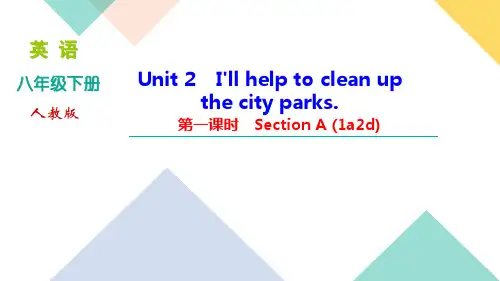
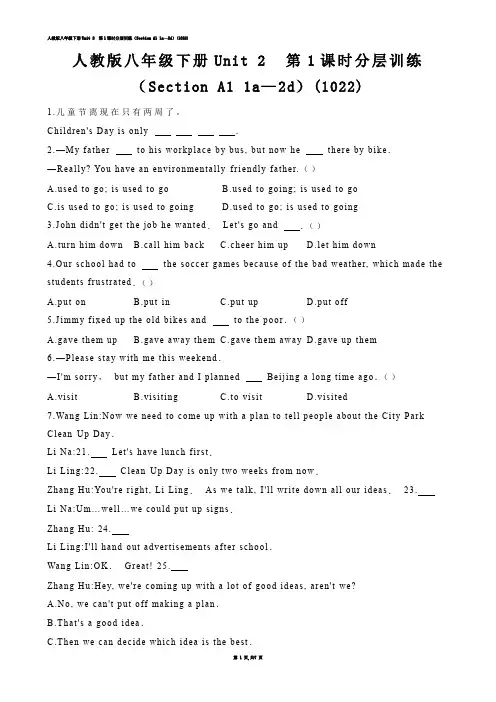
人教版八年级下册Unit 2 第1课时分层训练(Section A1 1a—2d)(1022)1.儿童节离现在只有两周了。
C h ild re n'sD a y is o n ly .2.—M y f a th e r to h is wo r kp la ce b y b u s, b u t no w he th e re b y b ik e.—Re a lly? You ha ve an e n vir on me n ta lly-f r i e n d ly f a th e r.()A.u s ed to g o; is u s ed to g o e d to g o ing; is use d to g oC.is u s ed to g o; is u sed to g o ingD.u s ed to g o; is u s ed to g o in g3.J oh n d id n't g e t th e jo b h e wan te d.Le t's g o an d .()A.tu r n h im d o wnB.ca ll h im b a ckC.ch e er h im u pD.le t h im d o wn4.O u r s c ho o l h a d to th e s o cc e r g a me s be c a us e o f th e b ad weath e r,wh ich ma d e th e s tu d en ts f r u s tra te d.()A.p u t o nB.pu t inC.pu t upD.p u t o ff5.J immy f ix e d up the o ld b ik e s a nd to th e po o r.()A.g a ve the m u pB.ga ve a wa y th e mC.ga ve th e m a wa yD.g a ve up the m6.—P le a se s ta y with me th is we e ke n d.—I'm s o r r y,bu t my f a th e r a n d I p la n ne d B e ijin g a lo n g time a go.()A.vis itB.vis itin gC.to vis itD.vis ite d7.Wa n g Lin:N o w we ne e d to co me u p with a p la n to te ll p e op le a bo u t the C ity P a r kC le an-U p Da y.Li N a:21.Le t's h a ve lu n c h f ir s t.Li Lin g:22.C lea n-U p D a y is o n ly two we e k s f ro m n o w.Zh a n g H u:Yo u'r e r ig h t,Li Lin g.A s we ta lk,I'll wr ite d o wn a ll o u r ide a s.23.Li N a:U m…we ll…we c o u ld pu t u p s ign s.Zh a n g H u: 24.Li Lin g:I'll h a n d o u t ad ve r tis e me n ts a f te r sch o o l.Wa ng Lin:O K.G re at!25.Zh a n g H u:H e y,we'r e c o min g up with a lo t o f go o d id ea s, a r e n't we?A.No,we c an't p u t o ff ma k in g a p lan.B.T ha t's a g o o d id ea.C.T he n we c an d e c id e wh ic h id e a is the be st.D.B u t I'm h u n g r y.E.A nd we c ou ld e a ch c a ll u p te n p eo p le a nd a s k th e m to co me.(1)(2)(3)(4)(5)8.Wh e n J a c k me t C ha rle s on th e s tr ee t, Ch a r le s was a s k ing f o r mo ne y to h e lp sa ve h is d o gB ig.B ig was ve r y 26 .D o c to r s to ldC ha r le s th a t h e c ou ld le t B ig d ie, 27 h e h a d to pa y $2,000 f o r Big's o p e r a tion(手术).C ha r le s c ou ld n't lo s e Big.B ig is28to h im,b u t he29a ff o r d(负担得起) th e o pe r a tio n.Ch a r les, h owe ve r,wa s no t r e ad y to30 B ig, a nd he wa n ted to d o s o me th in g to s a ve B ig's lif e.J ac k is a 31 f o r an a n ima l c h a r ity.H e s e n t th e s to r y a n d a pho to o f C h a r le s a nd B ig o n the In te r ne t, an d h e a s k ed pe op le to 32 mo ne y f o r B ig.33 a s h o r t time, do g lo ve r s co lle c ted e n ou gh mo n e y.A nd B ig 34h a d the o pe r a tion.Th e d oc to r s a id B ig wo u ld ge t we ll in s e ve ra l wee k s.E ve r yo n e wa s ex c ited to h ea r th e 35 , e sp e c ia lly(尤其是) Ch a r le s.H e sa id h e wou ld ta ke g ood c a r e o f B ig an d he wa n te d to b e a vo lu n tee r, to o.(1)A.s ic kB.s tr on gC.c le ve rD.g o od(2)A.ifB.orC.soD.b e ca u s e(3)A.n o th in gB.an yth in gC.e ve r yth in gD.so me th i n g(4)A.n e ed n'tB.mu s tn'tC.co u ld n'tD.sh ou ld n't(5)A.g ive a wa yB.g ive u pC.g ive o ffD.g ive o u t(6)A.d o c to rB.ma n ag e rC.vo lun te e rD.wo r k e r(7)A.b o r ro wB.len dC.r a iseD.g e t(8)A.A tB.InC.B e fo r eD.On(9)A.so onB.ju s tC.e venD.a lwa ys(10)A.a d vic eB.p la nC.ide aD.n e ws9.Ea c h na tio n ha s ma ny p e o p le wh o h e lp to ta k e c a re o f o th e r s.Fo r ex a mp le, s o me h ig h s c h oo l an d c o lle ge s tud e n ts in the U SA o f ten s pe n d ma n y h o u r s as vo lu n te e rs in th eh o s p ita ls, o r p ha n ag e s(孤儿院)o r o ld p eo p le's h o me s.Th e y r e a d b o ok s to the p e op le o r th e y ju s t vis it th e m a n d p la y g a me s with them o r lis te n to th e ir p ro b le ms.O the r yo u n g vo lun te e rs g o a nd wo rk in th e ho me s o f pe op le who ar e s ic k o r o ld.Th e y p a in t, c lea n up o r r e pa ir th e ir ho u se s, do th e ir s h o pp in g o r mo w(割,修剪) th e ir la wn s.Fo r b o ys wh o n o lo ng e r h ave f a th e r s, th e r e is a n o rg a n iza tio n c a lle d “Big B ro th e r s”.C o llege s tu d en ts an d s o me o the r me n ta k e the s e b o ys to p la y b a s eb a ll g a mes a nd h e lp the m g e t to k n o w th in gs th a t b o ys u s ua lly le a r n f r o m th e ir f a th e rs.E a ch c ity h a s a nu mb e r o f c lub s wh er e bo ys a n d g ir ls c an go to p la y g a me s.S o me o f th e s e c lu b s s ho w f ilms o r o rg a n ize s h o r t tr ip s to the mo u n ta in s o r s o me p la c e s o f in ter e s t.M o st o f the s e c lub s u s e a lo t o f h igh s c ho o l a nd c o lle g e s tu de n ts a s vo lu nte e r s b e ca u s e the y a r e yo u n g e n ou gh to k no w th e p r o b le ms a n d n eed s o f yo u n g bo ys a n d g ir ls.Vo lu n te e r s b e lie ve that s o me o f the ha pp ie s t p e op le in th e wo r ld ar e th o se who h e lp tob r in g h ap p ine s s to o the r s.根据短文内容,判断正(T)误(F)。

Section A 单词cheer v.欢呼;喝彩volunteer v.义务做;自愿做n.志愿者sign n.标志;信号notice n.通知;通告;注意v.注意到;意识到lonely adj.孤独的;寂寞的several pron.几个;数个;一些strong adj.强烈的;强壮的feeling n.感觉;感触satisfaction n.满足;满意joy n.髙兴;愉快owner n.物主;主人journey n.(尤指长途)旅行;行程raise v.募集;征集alone adv.独自;单独midnight n.午夜;子夜短语clean up打扫(或清除)干净cheer up (使)变得更高兴;振奋起来give out分发;散发come up with想出;提出(主意、计划、回答等)put off推迟hand out 分发call up打电话给(某人);征召used to曾经……;过去……care for照顾;非常喜欢try out参加……选拔;试用句型1.They told me stories about the past and how things used to be.他们给我讲过去的生活经历,讲过去是什么样子的。
2.…but I want to learn more about how to care for animals.……但是我想更多地了解如何照料动物。
句型1.I’m sure you know that this group was set up to help disabled people like me.我确定你知道这个团体是为了帮助像我这样的残疾人而建立的。
2.You helped to make it possible for me to have Lucky.有了你的帮助,我才有可能拥有“幸运儿”。
3.I’ll send you a photo of him if you like,and I could show you how he helps me.如果你喜欢,我会把它的一张照片寄给你,并可以让你看看它是怎样帮助我的。
Unit 2 I’ll help to clean up the city parks.Section A 1 (1a-2d)一、教学目标:1. 语言知识目标:1) 能掌握以下词汇:clean up, cheer, cheer up, give out, volunteer, come up with, put off, sign, notice, hand out, call up, used to, lonely, care for 能掌握以下句型:① You could help to clean up the city parks. ② We should listen to them and care for them. 2) 能了解以下语法:情态动词could, should 的用法;用should 或could 提出建议并对别人的建议作出评价。
如何表达主动提供帮助。
2. 情感态度价值观目标:在授课过程中渗透助人就是助己,在授课过程中渗透助人就是助己,助人收获快乐的情感目标,助人收获快乐的情感目标,助人收获快乐的情感目标,使学生在谈论使学生在谈论如何为别人提供帮助的对话中能意识到尽己所能,如何为别人提供帮助的对话中能意识到尽己所能,帮助他人,帮助他人,乐于奉献是一种良好的品德,培养学生为他人着想,热爱公益事业,乐于助人的优良品质。
二、教学重难点m1. 教学重点:1) 掌握这些词汇的构成和用法:clean up, cheer, cheer up, give out, volunteer, come up with, put off, sign, notice, hand out, call up, used to, lonely, care for 2) 学会提供帮助的基本句型:I hope to work outside. You could help to clean the city parks. The boy could give out food at the food bank. 2. 教学难点:学会提供帮助的基本句型。
Unit 2Part 1: Teaching design (第一部分:教学设计)SECTION AGoals●To learn to use p hrasal verbs●To read about being a volunteer●To listen and talk about clean up the city pa rksProceduresWarming up by learning about grammar focusHello, class. This week we shall go and help clean up the city parks. But first what is the meaning of “clean up”? What verb is it?Turn to page 61 and look at the chart to learn about “phrasal verb”What is a phrasal verb?▲It is an English verb followed by one or more particles where the combination behaves as a syntactic and semantic unit; “turn out” is a phrasal verb in the question “how many turned out to vote?”▲In the English language, a phras al verb is a verb combined with a preposition, an adverb, or an adverbial particle, all three of which are uninflected.1a Looking and readingLook at the bulletin board on page 60 and read about ways by which you could help people. Then list other ways you could help people.1b Listening and completingYou are going to listen to several conversations.While listening, pay attention to information to complete the sentences on page 60 in the box.1c Doing pairworkIn pairs you are to practice the conversations in the picture on page 60. Then make similar conversations using the information in activity 1b.We could help stop hunger by giving out food2a Listening and checkingSome students talking about planning a City Parks Clean-up Day. Listen to their talk and check√the things they are going to do.2b Listening and filling in blanksI’ shall play the tape again and you are to listen and fill in the blanks in the box on 61.2c Doing pairworkLet’s go on to role play the conversation in activity 2b.3a Reading, underlining and circlingOn page 62 is an article about volunteers. Read it and underline the kinds of work they do. YouRead the article again to darken the phrasal verbs found in it.3b Filling in the tableOn page 62 is a table showing the kinds of volunteer work the four students could do. Read thetable and fill in it.3c Doing pairNext take turns role playing being one of the people in 3b by asking and giving advice.4 Doing pairworkIn the table on bottom of page 62 write down three things you like to do and then ask your partner for advice about the kinds of volunteer work you could do.Closing down by reading an English poemFalling Asleep in ClassI fell asleep in class today,as I was awfully bored.I laid my head upon my deskand closed my eyes and snored.I woke to find a piece of papersticking to my face.I'd slobbered on my textbooksand my hair was a disgrace.My clothes were badly rumpledand my eyes were glazed and red.My binder left a three-ringindentation in my head.I slept through class, and probablyI would have slept some more,except my students woke meas they headed out the door.Kenn NesbittSECTION B●To Learn more phrasal verbs●To listen, speak and write using phrasal verbsProceduresWarming up by brainstorming phrasal verbsHello, everyone. To begin with, we shall brainstorm a list of phrasal verbs.On page 63 is a box with 4 sentences. Match them with their similar meanings on the right.1b Making sentencesOn page 63 you will find a box with some phrasal verbs. Make a sentence with each of the phrasalverbs.2a Listening and numberingListen to the recording that I am going to play and number the pictures on page 63. (Key:a4,b2,c1,d3 )2b Listening and circlingYou shall listen to the recording again to circle “T” or “F”.2c Doing pairworkIn pairs practice the conversations between Jmmy and the reporter. Use the information from the activities on page 63.3a Reading and underliningOn page 64 is an article about Jimmy the Bike Boy. Read to understand it and underline all the phrasal verbs.Copy all the phrasal verbs and useful expressions onto your notebook.3b Making a noteRead the article again to make a note of the things that Jimmy did in order to sole his problem.1.He did a radio interview.2.He also put up some signs asking for old bikes.3.He called up all his friends and told them about the problem.4.He even handed out advertisements at a local supermarket.5.He told the teachers at school about his problem and they set up a call-in center for parents.4 Doing groupworkBy brainstorming work out a plan for helping out in your community. Write down where and what you will volunteer and tell your classmates about your plan.Closing down by talking about volunteer workLook at the pictures below and talk about the volunteer work that the people in the pictures aredoing.SELF CHECK1.Filling and makingTurn to page 65 and fill in the blank with a correct word given in its correct form. Then make a sentence with each of the given words.2 Writing an article tell about SallyOn page 65 is a box with words and phrases. Write an article telling about what happens to Sally.Just for funLook at the pictures and make a storyout of them.Reading: I’ll send you a photo ofLucky.Before you read, listen to the recording without looking at the article.While you read,underline all the phrasal verbs, blacken all the expressions all the linking words.After you read, copy down all the phrasal verbs and useful expressions into your notebook.Part 2: Teaching Resources (第二部分:教学资源)I. What is a volunteer?A volunteer is someone who performs or offers to perform a service out of his own free will, oftenwithout payment. The year 2001 was the International Year of the Volunteer. 2005 is the UK Year of the Volunteer.People may volunteer to perform some work, e.g., of charitable character. Some volunteer for clinical trials or other medical research, and may even donate their bodies to science after their death.II. What is an online Volunteer?An online volunteer is a person who contributes time and effort with an organization through an online connection, rather than in person. A wide variety of people from around the world are online volunteers and most are not technology professionals.Online volunteers may provide advice, consultancy and perform remote administration tasks for the organisation, usually a charity or non-profit organisation. The practice of donating time online goes by other names, such as virtual volunteering, cyber service, telementoring, e-volunteering, and cyber volunteering.There are many opportunities for people to donate their services using the internet. Online volunteers do a variety of tasks, such as translating documents, editing or preparing proposals, designing logos, researching information, developing strategic plans, reviewing budgets, creating web pages, designing flash presentations, moderating online discussion groups and managing other online volunteers.III. What is an ICT Volunteer?An ICT volunteer is someone who is working to foster the implementation and use of Information and Communication Technologies. He or she can install hardware, software or carry on with ICT training programmes. There is no need to be an online volunteer to be an ICT volunteer: installing hardware is a good example. Likewise, there is no need to be an ICT volunteer to be an online volunteer: teaching a language through a virtual campus is not related with ICT fostering, at least in a direct way.....。